The rise of low-calorie and sugar-free ice cream brands reflects a growing demand for indulgent treats that align with health-conscious lifestyles. The ice cream industry is responding to meet these demands. Industry’s growing interest in low-calorie and sugar-free ice cream brands is examined in this article.
Table of Contents
The ice cream market has undergone a significant shift in consumer preferences toward healthier and lower-sugar variants over the past few years. Low-calorie and sugar-free product options have made their way into the ice cream market landscape. The demand for high-protein, low-sugar, and low-calorie ice creams is increasing, which is likely to create more revenues in the global ice cream market over the coming years.
The article explores the rise of low-calorie and sugar-free ice cream brands, as well as the nutritional benefits and challenges associated with these products. It also provides an overview of the current market size of teh ice cream industry and highlights some prominent brands offering these healthier alternatives.
The global sugar-free ice cream market is expanding rapidly, with the latest research indicating a projected CAGR of 8.9% to 9.1% from 2023 to 2028. In 2024, the market was valued at around USD 1.5 billion and is expected to reach USD 3.2 billion by 2033. This surge is fueled by rising health awareness, particularly concerning obesity, diabetes, and metabolic disorders. Consumers gravitate toward low-calorie, dairy-free, organic, and artisanal ice creams that offer unique flavors and use innovative sweeteners such as stevia and monk fruit, balancing indulgence with improved health profiles.
The broader global ice cream market is anticipated to grow at a CAGR of around 5% during 2023-2028, driven by constant consumer interest in traditional, premium, and novel varieties. Strong demand is observed in the Asia-Pacific region, where rising disposable incomes and urbanization continue to fuel market expansion. North America and Europe remain core markets, propelled by the popularity of indulgent and high-quality premium ice creams.
Also Read: Sustainable Scoops: Ice Cream Companies and Environmental Challenges
Also Read: Scoop into the Future: Emerging Trends in Ice Cream Industry
Trends in Ice Cream Industry
Low-calorie, sugar-free ice cream brands have become some of the most prevalent types of healthy ice creams on the market. Ice cream brands like Amul, Halo Top, Arctic Zero, and Enlightened have pioneered this segment, offering guilt-free indulgence with significantly fewer calories compared to traditional ice cream.
“Our mission has always been to make ice cream that people can enjoy without the guilt,” says Doug Bouton, CEO of Halo Top. “By using natural sweeteners and high-quality ingredients, we’ve created a product that’s both delicious and low in calories,” Bouton explains.
1. Low-Calorie Ice Cream:
Brands are now innovating with alternative sweeteners and functional ingredients to meet the nutritional needs of modern consumers. This aligns with the growing trend toward naturally derived sugar alternatives.
Low-calorie ice cream is quickly gaining traction among health-conscious consumers, offering indulgence without the burden of excessive calories. These products frequently incorporate alternative sweeteners such as erythritol, stevia, and monk fruit, which maintain sweetness while reducing calorie content. Additionally, ingredients like skim milk, whey protein, and added fiber are used to improve both texture and nutritional value, creating a balanced product for diverse dietary preferences.
According to a recent market study, the global low-calorie ice cream market is projected to grow at a CAGR of 7.2% from 2023 to 2028, driven by the increasing consumer demand for healthier alternatives. The shift towards mindful eating has fueled the popularity of these products as more consumers seek options that align with their health goals without compromising on taste.
India’s frozen dessert market is also evolving rapidly. As highlighted in recent emerging trends in the ice cream industry, consumer preferences are shifting toward products that are not just tasty but also perceived as healthier and eco-friendly.
This transformation has been supported by the broader opportunities for the ice cream industry in India, where innovation, clean labeling, and health claims play a crucial role in capturing market share.
“We believe everyone should be able to enjoy a sweet treat, no matter their dietary needs,” states Michael Shoretz, CEO of Enlightened. “Our sugar-free ice creams are crafted to provide the same indulgence as traditional ice cream but without the sugar,” Shoretz added.
2. Sugar-Free Ice Cream:
Sugar-free ice cream caters to consumers who are conscious of their sugar intake, whether for weight management, diabetes, or overall health. These products use sugar substitutes like sucralose, aspartame, and natural sweeteners to replicate the taste of traditional ice cream without the added sugar. However, it is important to consider that some artificial sweeteners can cause digestive discomfort in sensitive individuals.
Amul, one of the flagship ice creams brands of India, and the largest milk cooperative, has also entered the sugar-free market. “Even those with diabetes can now enjoy our ice cream,” said Jayen Mehta, Senior Official of the Gujarat Co-operative Milk Marketing Federation. This expansion highlights the growing interest in catering to specific dietary needs in emerging markets like India.
Also Read: Chilling Through Time: A Brief History of Ice Cream Brands in India
Also Read: A Scoop Through Time: The Rich History of Ice Cream Brands in USA
Nutritional Benefits and Challenges
While low-calorie and sugar-free ice creams offer various health benefits, they also present unique challenges for both consumers and manufacturers.
Nutritional Benefits:
- Reduced Caloric Intake: These products allow consumers to indulge in their favorite desserts without the guilt of consuming excess calories, making it easier to maintain a balanced diet.
- Lower Sugar Content: Sugar-free ice creams help manage blood sugar levels, making them suitable for individuals with diabetes or those aiming to reduce sugar consumption.
- Added Nutrients: Many healthier ice cream variants are fortified with protein, fiber, and essential vitamins, contributing to a more balanced diet.
Nutritional Challenges:
- Taste and Texture: Replicating the creamy, rich texture of traditional ice cream in low-calorie or sugar-free alternatives is a challenge. Manufacturers continually experiment with ingredients and processes to mimic the mouthfeel of full-fat ice cream.
- Ingredient Transparency: Today’s consumers are more discerning about ingredient labels, seeking natural and recognizable components. This demand for “clean labeling” drives manufacturers to find innovative ways to produce healthier ice cream without compromising on taste or quality.
- Digestive Issues: Some sugar substitutes, particularly sugar alcohols like erythritol and xylitol, may cause digestive discomfort in sensitive individuals. Ice cream brands must carefully balance the use of these ingredients to minimize potential side effects.
“We’re committed to offering ice cream that not only tastes great but also fits into a healthy lifestyle,” says Amit Pandhi, CEO of Arctic Zero. “Our products are designed to provide the same enjoyment with fewer calories and less sugar,” Pandhi elaborates.
“Creating a dairy-free ice cream that meets our consumers’ health needs and taste expectations is a constant balancing act,” explains Joe Scalzo, CEO of So Delicious. “We focus on using high-quality, plant-based ingredients to deliver a product that is both nutritious and enjoyable.”
Journey to Perfecting These Trends
The health and wellness trend in the ice cream industry reflects a broader shift in consumer preferences toward healthier, more mindful eating habits. Low-calorie and sugar-free ice creams have carved out a significant niche in the market, offering alternatives that cater to dietary needs without sacrificing indulgence.
According to market projections, the global ice cream industry is expected to grow at a steady rate, with a significant portion of this growth attributed to health-conscious consumers. The increasing demand for plant-based options, sustainable packaging, and innovative flavor combinations will continue to shape the industry.
However, the journey to perfecting these healthier alternatives is far from over. Manufacturers must continue to strike a balance between taste, texture, and nutritional value to meet consumer expectations. Technological innovations, such as advanced freezing techniques and AI-driven flavour development, are helping brands create more consistent and enjoyable textures, even in low-fat and sugar-free options.
Moreover, the focus on sustainability has impacted how ice cream is made and packaged. Many leading brands are embracing sustainability efforts by ice cream brands to reduce their environmental impact.
As the ice cream industry evolves, it will be exciting to see further innovations that meet the growing demand for health-conscious indulgence. With the global ice cream market projected to reach USD 97.85 billion by 2027, the focus on trends in health and wellness will undoubtedly play a crucial role in shaping the future of this beloved treat.
Additionally, India’s diverse dairy landscape—reflected in the offerings of the top 10 ice cream brands in India—has embraced the challenge, providing a variety of products tailored to different dietary needs.
As the trend continues, we can also expect to see more herbal ice creams using traditional ingredients, tapping into the Ayurveda and wellness movement for added value.
Prominent Ice Cream Brands Offering Healthier Ice Creams
As health-conscious consumers increasingly seek alternatives to traditional high-sugar ice creams, many leading brands have introduced innovative products that cater to specific dietary needs without sacrificing flavor or texture. Below are some of the prominent ice cream brands leading the way in the healthier ice cream segment:
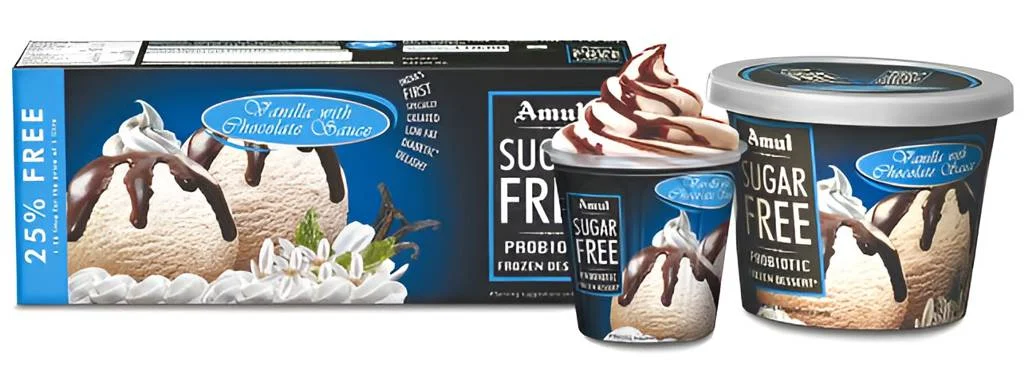
1. Amul Sugar Free ProLife Ice Cream
Amul, a leading dairy brand in India, now offers a new range of ProLife Sugar Free Ice Cream, which is perfect for diabetics who want to enjoy ice cream without any worries. Made with high-quality ingredients and sweetened with artificial sweeteners, this ProLife Sugar Free ice cream ensures a guilt-free indulgence. This range ensures that consumers can enjoy a guilt-free indulgence while still satisfying their sweet tooth.
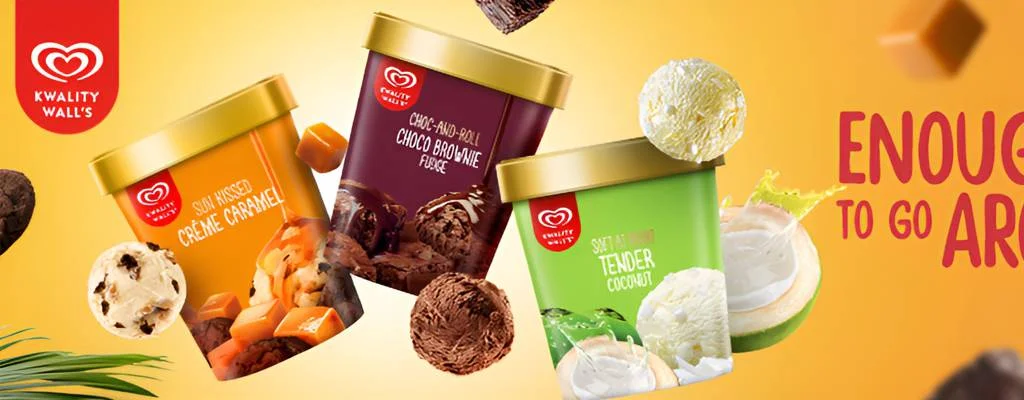
2. Kwality Walls Sugar Free Selections
Kwality Walls is a renowned brand of frozen desserts in India offers seven sugar free ice cream flavours besides the basic Vanilla, there’s also Tuttie Fruittie, Saffron Pistachio, Cashew Raisin, Rose Petals, Pistachio Nuts, and Famous Figs. This wide variety allows consumers to enjoy flavorful and exotic ice creams without compromising their health goals.

3. Baskin Robbins D’Lites Sugar Free
Baskin Robbins has introduced a sugar free range that caters specifically to the needs of diabetic ice cream lovers. Their range includes popular flavours like Strawberry and Bavarian Chocolate. All these flavours are made sugar free without compromising on the rich, creamy texture that Baskin Robbins is known for. By focusing on texture and taste, Baskin Robbins ensures that even sugar-free offerings deliver a premium ice cream experience.
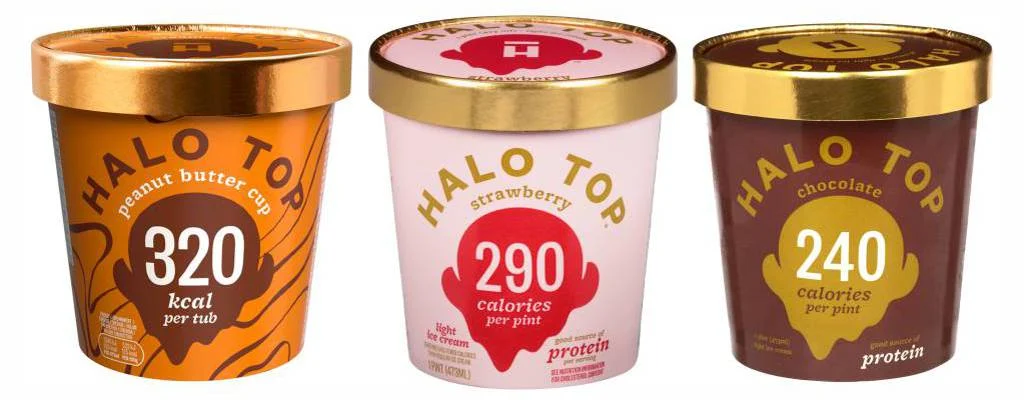
4. Halo Top:
Halo Top is renowned for its low-calorie, high-protein ice creams that come in a variety of flavours. Using sugar substitutes like stevia and erythritol, Halo Top has managed to create a product that is both delicious and diet-friendly. With its emphasis on protein content and low sugar, Halo Top continues to dominate this niche market, appealing to those seeking healthier indulgences without the guilt.

5. Arctic Zero:
Arctic Zero specialises in lactose-free, low-calorie ice creams that are sweetened with monk fruit and organic cane sugar. Their products are also low in fat and high in fibre, catering to health-conscious consumers. Their focus on natural sweeteners and lactose-free options aligns with growing consumer trends toward plant-based and allergen-friendly products.

6. Enlightened:
Enlightened offers a range of low-calorie ice creams that are also low in sugar and fat. The brand uses erythritol and monk fruit as sweeteners and incorporates ingredients like skim milk and milk protein concentrate to ensure a creamy texture. Enlightened’s approach showcases the brand’s commitment to offering products that cater to the modern consumer’s desire for healthier alternatives.
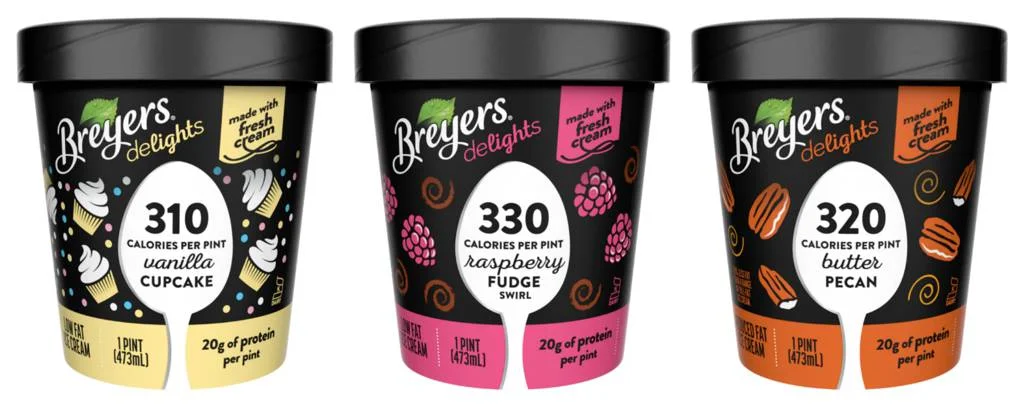
7. Breyers Delights:
Breyers Delights is another popular brand offering low-calorie and high-protein ice creams. They use sugar alcohols and stevia to reduce sugar content while maintaining flavour and sweetness. With a focus on keeping the calorie count low without sacrificing taste, Breyers Delights has become a go-to option for consumers looking for healthier ice cream alternatives that don’t compromise on taste or texture.
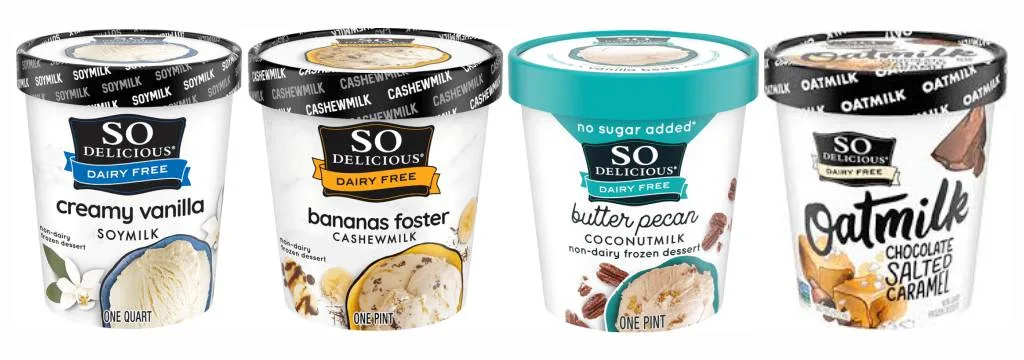
8. So Delicious:
So Delicious focuses on plant-based, dairy-free ice creams that are also low in calories. Using coconut milk, almond milk, and cashew milk as bases, they offer a range of flavours that cater to vegan and lactose-intolerant consumers. So Delicious addresses the growing demand for plant-based options in the frozen dessert category, tapping into the broader trend toward sustainable and health-conscious eating.

















